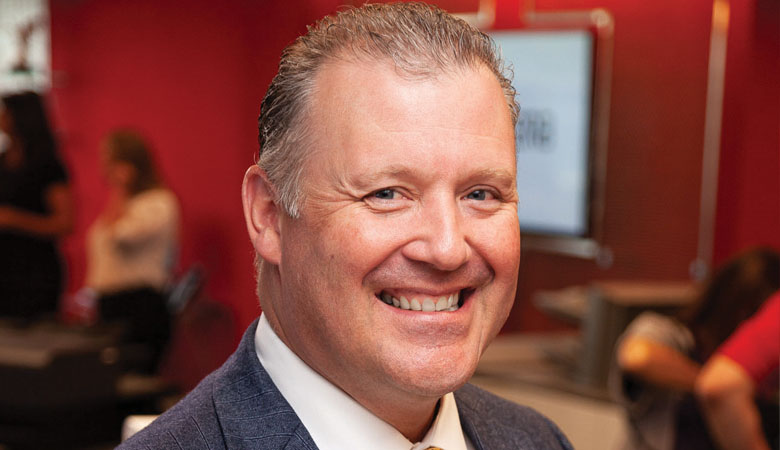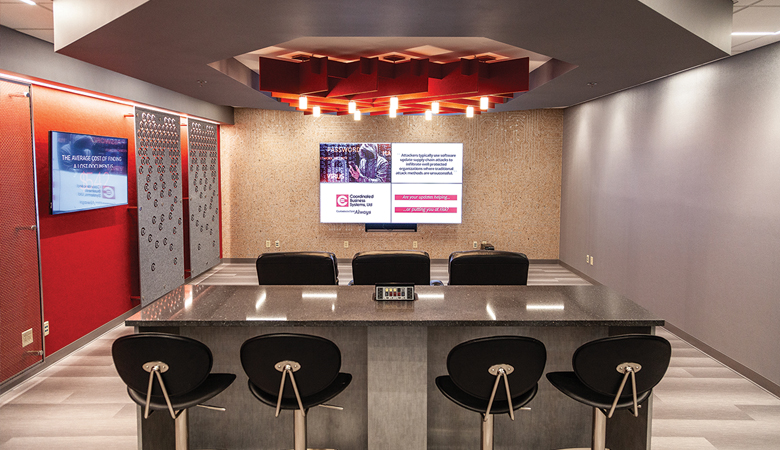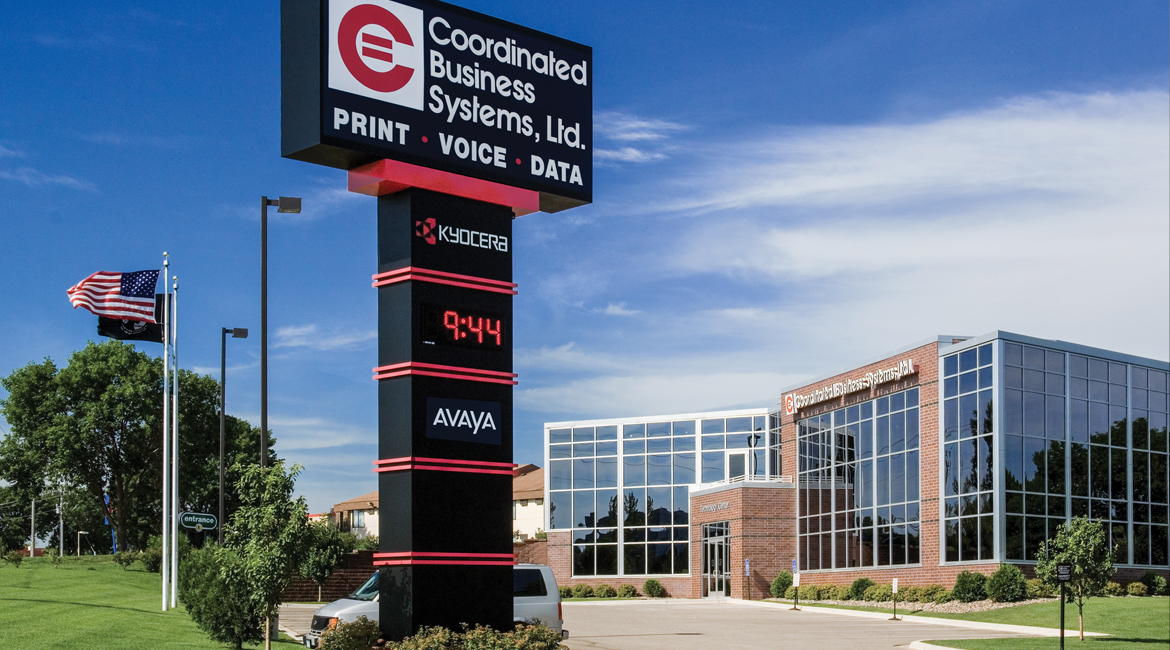
Strong leadership, good people, and loyal customers provide a competitive edge.
Coordinated Business Systems in Burnsville, Minnesota, has a pretty good track record as an independent dealer. Start with 40 years in business, a feat that many dealers in the office technology industry would envy.

Jim Oricchio
Founder and Chief Executive Officer Jim Oricchio started the business with two partners based out of Chicago in 1983. The two partners had originally worked for APECO, one of the bigger dealerships in the industry at the time. They were launching a new business and wanted Oricchio to join them in the Windy City. Unwilling to move or leave his family behind in Minnesota, Oricchio was then offered an opportunity to open a branch in Minneapolis. That was an offer he couldn’t refuse.
The competition was intense with some significantly sized dealers already established in the region. “There were a lot of challenges, but we stayed the course,” recalled Oricchio. “We were the underdog a lot of times, but remained focused and treated our employees fantastically, and stayed loyal to Mita [now Kyocera].” After his partners sold their portions of the business to IKON, Oricchio bought out his partners with a loan from Mita and became the sole owner of the Minneapolis location. Since then, his dealership has been steadfastly loyal to Kyocera.
“I remember Frank [Cannata)] challenging me at the beginning, ‘Why are you sticking with Mita?’” reminisced Oricchio. “I said, ‘Because they stuck with me.’ It’s been a great relationship.”
Power to the People
Oricchio credits much of his dealership’s longevity to having great people. “You can’t survive without good people,” he said. “They have to commit, and they have to like what they’re doing.”

Kirk Studebaker
When asked how Coordinated Business Systems finds good people, Kirk Studebaker, the dealership’s president, replied, “For a couple of years, we didn’t. It was nearly impossible, but the job market has flattened out some, and we are backfilling positions pretty rapidly now.”
The dealership has an in-house dedicated recruiter whose role is to source candidates and conduct a quick screen. She’s not involved in the interview process. Coordinated Business Systems also worked closely with office technology industry veteran Mike Riordan who knows a thing or two about building a quality sales organization for sourcing candidates.
During the last six months, the dealership has been hiring new talent. “We’re a sales organization, so we’ll never be full,” acknowledged Studebaker. “But we’re certainly closer to it than we were six months ago. The good news is we didn’t lose anybody in The Great Resignation like many of our peers.”
The best candidates aren’t always those with experience in the office technology industry. “We try not to hire retreads,” said Studebaker.
“We are more focused on people coming from similar industries that have an interest in making a change. We aren’t focused on trying to hire industry talent. The success rates on that are pretty low. There has to be a congruent reason for them to want to make that change. We have some pretty big dealerships in this market, and if there’s somebody that wants to change careers, there needs to be a good reason because, honestly, it’s the same job. The perfect candidate has some experience in sales. They’ve been out in the world a little bit, and they’re looking for the right opportunity, the right fit in the company, and they have a can-do, will-do attitude.”
Surviving Challenging Times
Coordinated Business Systems did an excellent job of navigating the pandemic. “We didn’t have the retraction in 2020 that most did,” reported Studebaker. “We managed it pretty well. Our revenues remained flat from 2019 through 2021, and we saw huge growth in 2022.”

Coordinated Business Systems’ demo room offers a comfortable atmosphere for a closer look at the various technologies the dealership sells.
He added that the dealership figured out how to sell through the pandemic. “We came up with programs to help our customers that at the same time helped us,” said Studebaker. “We just renewed a pretty substantial customer. We don’t do a lot of big major account business, but we renewed this customer, and they said to us, ‘We’ll never forget what you did for us during COVID.’”
Supply-chain issues did not hit Coordinated Business Systems as hard as other dealers either. In fact, the dealership was prepared for it. “That didn’t come out of the blue,” observed Studebaker about the post-COVID supply-chain problems. “We started increasing some inventories early on to deal with that. That was harder than COVID. It certainly was impactful, but we never reached the millions of dollars in backorders that some did.”
Beyond Print at Coordinated Business Systems
For a 40-year-old office technology dealership, MFPs and printers are still critical to the core business, but Oricchio has long had the attitude that it is equally important to diversify. That’s why in 1997 he added DocStar document management software, which the dealership successfully sold for a number of years. “I wanted to diversify because I worried about the lifespan of the copier business,” said Oricchio.

The dealership’s intimate meeting room which is used for remote meetings.
Asked how he feels about the lifespan of the copier business today, Oricchio replied, “I think it’s good. The reason why I think it’s good is because a copier’s more than a copier today. The volume has dropped, but we’re making it up in network and subscription services. Telephony and network services are big growth areas.”
The dealership started offering telephony in 2014 after it acquired a telephone dealership that sold AVAYA on-premises systems. It still offers those products to customers that don’t have the infrastructure to support cloud-based communications. However, 99% of what Coordinated Business Systems sells today is cloud-based. Most customers who started out with the AVAYA system have been converted to Intermedia’s UCaaS solution.
“It’s a good Trojan Horse, too; it gets you in the door,” noted Studebaker about telephony, a segment of the business that exploded during the pandemic.
Managed IT is responsible for 20% of Coordinated Business Solutions’ revenues, but it wasn’t always that way. Oricchio remembers attending a seminar on servicing networks, and as he recalled, “I really didn’t know how to do it, and this industry expert on network services is talking about all the stuff not to do. I raised my hand and said, ‘I’m your poster boy for doing everything wrong.’ But I believed in it.”
“It’s 20% of our revenue, not because the copier business has shrunk, it’s 20% because it’s growing at a good clip,” added Studebaker. “We have a guy running that division who is an ace, and he’s doing a great job. He’s got a great team, and it continues to grow and grow and grow.”
Most IT opportunities are with new customers. “The idea that you’re going to convert all your copier customers to IT was a fantasy from the beginning,” said Studebaker. “Our copier customers didn’t look at us that way. We have far better success getting a net new customer as an IT customer. Then, you get the copier.” A separate sales force is responsible for this segment of the business, although the dealership’s imaging reps handle some of the prospecting.
Besides Kyocera, Coordinated Business Systems also sells Sharp. It partnered with Sharp to take advantage of the OEM’s higher-speed machines. As far as production print, Coordinated Business Systems isn’t focused on it. “We have some pretty heavy hitters in the production print space in this market that do a fantastic job,” said Oricchio.
The Coordinated Business Systems Difference
Why do customers select Coordinated Business Systems over larger competitors? “The ones that do, we align well with,” said Studebaker. “You’re going to have a different experience with a company of our size. We’re 115 people, and the next smallest competitor has 600 people. It’s not a worse experience or a better experience, just a different experience.”
Salespeople are trained to emphasize that difference when meeting with prospects. “When someone asks that question, why would I consider Coordinated over my current vendor? Our answer consistently is, ‘Well, I really don’t know that you should. We need to learn a little bit more about each other and find out if we’re a good fit,’” explained Studebaker. “When we’re a good fit, we get the customer, and we keep that customer.”
Want proof? Coordinated Business Systems still has its first customer from 40 years ago. How many dealers can say that? Tenured employees are another asset, as are long-term relationships with its equipment suppliers. “If those things are important to a client, they’re going to buy from us,” said Studebaker.
The Next 40 Years for Coordinated Business Systems
Asked if he could imagine himself sitting here talking to The Cannata Report 40 years after starting the business, Oricchio quipped, “Yes.”
He then added, “I love this business. I love the industry. There were people that thought this industry would not last, or they complained about how bad it was. I never complained. It’s a great opportunity. It’s Americana. If you think about the people that started these dealerships, many of them, including myself, didn’t have a college degree or barely made it out of high school. It gave us an opportunity to build great, strong businesses and fantastic relationships. There’s a lot of future left in this business.”
Asked to paint a picture of the next 40 years, Oricchio said, “More acquisitions. You can’t grow without acquisitions. And there will be a lot more growth on the IT side.”
As the dealer population shrinks because of acquisitions, Studebaker also believes that Coordinated Business Systems must expand beyond its current borders. “To maintain any position with your vendor, you’re going to have to cover enough real estate to keep yourself relevant,” he said. “We don’t want to be a mega-dealer. That’s not who we are. We want to continue to have sustainable growth. We have a solid succession plan in place, and the company is structured to continue as an independent organization.”
There is one change looming on the horizon that has Studebaker concerned. “The future looks good as long as our products are sold and not bought,” he said, referring to e-commerce, a topic that’s a hot one in the office technology industry of late. He isn’t sold on that concept just yet. “Now, if people are right and it becomes a point-and-click business, we won’t change how we sell, we’ll change what we sell.”
The preference is to sell products and solutions that require a consultative sale and a team to install and support them, which leads to reoccurring revenue. “The strength of our company is our ability to open a door,” said Studebaker. “It’s not our ability to sell. Anybody can sell. It’s putting yourself in a selling situation. As long as that continues to be an important piece of what we do, we’ll continue to be successful.”



